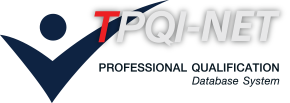หน่วยสมรรถนะ
Prepare and manage aviation maintenance organization budgets and financial.
สาขาวิชาชีพการบิน
รายละเอียดหน่วยสมรรถนะ
| 1. รหัสหน่วยสมรรถนะ | AVT-OTKJ-241A |
| 2. ชื่อหน่วยสมรรถนะ | Prepare and manage aviation maintenance organization budgets and financial. |
| 3. ทบทวนครั้งที่ | / |
| 4. สร้างใหม่ |
|
ปรับปรุง |
|
| 5. สำหรับชื่ออาชีพและรหัสอาชีพ (Occupational Classification) | |
|
7232 Aircraft engine mechanics and fitters |
|
| 6. คำอธิบายหน่วยสมรรถนะ (Description of Unit of Competency) | |
| This unit competition requires the application of procedures for the preparation and management of budgets and financial plans necessary to allow the effective functioning of an organization Aviation Maintenance (AMO) within the limits of their exposure and to interact effectively with advisers finance and professional accountants. | |
| 7. สำหรับระดับคุณวุฒิ |
| 1 | 2 | 3 | 4 | 5 | 6 | 7 | 8 |
|---|---|---|---|---|---|---|---|
| 8. กลุ่มอาชีพ (Sector) | |
| 10 Aircraft Mechanics | |
| 9. ชื่ออาชีพและรหัสอาชีพอื่นที่หน่วยสมรรถนะนี้สามารถใช้ได้ (ถ้ามี) | |
| 101 Aircraft Maintenance: Airplane102 Aircraft Maintenance:Helicopter103 Aircraft Maintenance: Avionic | |
| 10. ข้อกำหนดหรือกฎระเบียบที่เกี่ยวข้อง (Licensing or Regulation Related) (ถ้ามี) | |
| None | |
| 11. สมรรถนะย่อยและเกณฑ์การปฏิบัติงาน (Elements and Performance Criteria) |
| หน่วยสมรรถนะย่อย (EOC) | เกณฑ์ในการปฏิบัติงาน (Performance Criteria) | รหัส PC (ตามเล่มมาตรฐาน) |
รหัส PC (จากระบบ) |
|---|---|---|---|
| 101508.01 Analyse strategic opportunities ,intended maintenance activities, develop revenue, expenditure and capital investment proposals. |
101508.01.01 Strategic opportunities are expressed in terms of aircraft and aeronautical product maintenance activities and all intended maintenance activities are converted into special projects or work programs. |
101508.01.01 | 199427 |
| 101508.01 Analyse strategic opportunities ,intended maintenance activities, develop revenue, expenditure and capital investment proposals. |
101508.01.02 Proposals are developed taking account of past experience, present trends and future expectations, and outcomes of proposals are clearly linked to organisational strategic objectives. |
101508.01.02 | 199428 |
| 101508.02 Build agreement for budgets and financial plans. |
101508.02.01 Outcomes are confirmed in terms of clear, concise objectives and timeframes. |
101508.02.01 | 199429 |
| 101508.02 Build agreement for budgets and financial plans. |
101508.02.02 Budgets and plans incorporate the outcomes of negotiations and meet the Organisation’s approval processes, and final budget and plans are clearly documented and a communication plan developed. Budget/financial plan communication package is reviewed by finance specialists, and communication outcomes are tested to ensure clear understanding of objectives, processes and accountabilities. |
101508.02.02 | 199430 |
| 101508.03 Maintain and store backup copies of data, monitor and control activities against plans. |
101508.03.01 Delegations and budget accountabilities are confirmed in writing prior to budget period. Budgets and plans are renegotiated/restructured, where necessary, to optimise organisational performance. |
101508.03.01 | 199431 |
| 101508.03 Maintain and store backup copies of data, monitor and control activities against plans. |
101508.03.02 Non-financial objectives are reported in the context of overall organisational performance, strategies and plans are reviewed and updated to optimise organisational performance. |
101508.03.02 | 199432 |
| 12. ความรู้และทักษะก่อนหน้าที่จำเป็น (Pre-requisite Skill & Knowledge) | |
|
101401 |
|
| 13. ทักษะและความรู้ที่ต้องการ (Required Skills and Knowledge) | |
|
(ก) ความต้องการด้านทักษะ - (ข) ความต้องการด้านความรู้ - |
|
| 14. หลักฐานที่ต้องการ (Evidence Guide) | |
|
(a) Performance Evidence (b) Knowledge Evidence (c) Assessment recommendation |
|
| 15. ขอบเขต (Range Statement) | |||||||||||||||||||||||||||||||||
|
(a) Recommendation
(b) Description |
|||||||||||||||||||||||||||||||||
| 16. หน่วยสมรรถนะร่วม (ถ้ามี) | |
| N/A | |
| 17. อุตสาหกรรมร่วม/กลุ่มอาชีพร่วม (ถ้ามี) | |
| N/A | |
| 18. รายละเอียดกระบวนการและวิธีการประเมิน (Assessment Description and Procedure) | |
|
• The assessment are based on combination of paper exams, interviewing, and practical demonstrations depending on the assessors’ judgement. |
|
